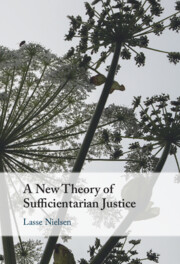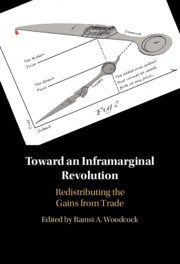Refine search
Actions for selected content:
117 results
Chapter 1 - Sufficientarianism
-
- Book:
- A New Theory of Sufficientarian Justice
- Print publication:
- 31 January 2026, pp 7-37
-
- Chapter
- Export citation

A New Theory of Sufficientarian Justice
-
- Published online:
- 12 December 2025
- Print publication:
- 31 January 2026
Introduction: Human Rights and Distributive Justice
-
- Book:
- In Defense of Economic and Social Human Rights
- Published online:
- 06 November 2025
- Print publication:
- 20 November 2025, pp 1-30
-
- Chapter
- Export citation
Utilitarianism does not dominate: a response to Chung
-
- Journal:
- Economics & Philosophy , First View
- Published online by Cambridge University Press:
- 14 November 2025, pp. 1-8
-
- Article
- Export citation

In Defense of Economic and Social Human Rights
- An Intellectual History, 1940 to the Present
-
- Published online:
- 06 November 2025
- Print publication:
- 20 November 2025
Private Right and Public Right
-
- Journal:
- Canadian Journal of Law & Jurisprudence , First View
- Published online by Cambridge University Press:
- 24 October 2025, pp. 1-13
-
- Article
-
- You have access
- Open access
- HTML
- Export citation
Defending the Juridical
-
- Journal:
- Canadian Journal of Law & Jurisprudence , First View
- Published online by Cambridge University Press:
- 03 October 2025, pp. 1-21
-
- Article
-
- You have access
- Open access
- HTML
- Export citation
Orthodox Private Law and Social Subordination
-
- Journal:
- Canadian Journal of Law & Jurisprudence , First View
- Published online by Cambridge University Press:
- 01 October 2025, pp. 1-15
-
- Article
-
- You have access
- Open access
- HTML
- Export citation

Toward an Inframarginal Revolution
- Redistributing the Gains from Trade
-
- Published online:
- 26 September 2025
- Print publication:
- 16 October 2025
Understanding affective organizational commitment in an academic context: Do leader–member exchange and distributive justice play a key role?
-
- Journal:
- Journal of Management & Organization , First View
- Published online by Cambridge University Press:
- 22 August 2025, pp. 1-23
-
- Article
-
- You have access
- Open access
- HTML
- Export citation
Critique of the entrepreneurial theory of ownership
-
- Journal:
- Economics & Philosophy , First View
- Published online by Cambridge University Press:
- 19 August 2025, pp. 1-9
-
- Article
- Export citation
A moderated mediation model of perceived control, fairness, and leader–member exchange in the United States and South Korea
-
- Journal:
- Journal of Management & Organization , First View
- Published online by Cambridge University Press:
- 23 July 2025, pp. 1-20
-
- Article
-
- You have access
- Open access
- HTML
- Export citation
What is Wrong With Winner-Takes-All?
-
- Journal:
- Journal of the American Philosophical Association / Volume 11 / Issue 4 / December 2025
- Published online by Cambridge University Press:
- 11 July 2025, pp. 800-819
-
- Article
-
- You have access
- Open access
- HTML
- Export citation
Welfare Users’ Perceptions of Distributive Justice and Trust When Facing Institutional Enigma
-
- Journal:
- Social Policy and Society / Volume 24 / Issue 4 / October 2025
- Published online by Cambridge University Press:
- 27 June 2025, pp. 701-717
- Print publication:
- October 2025
-
- Article
-
- You have access
- Open access
- HTML
- Export citation
How Thresholds Matter: On the Bounds and Demands of Justice
-
- Article
-
- You have access
- Open access
- HTML
- Export citation
Subsidiary Distributive Justice, Internal Embeddedness, and Subsidiary Initiative
-
- Journal:
- Management and Organization Review / Volume 21 / Issue 3 / June 2025
- Published online by Cambridge University Press:
- 11 April 2025, pp. 586-609
-
- Article
- Export citation
1 - Political Parenthood
-
- Book:
- Reconstructing Parentage
- Published online:
- 15 March 2025
- Print publication:
- 27 March 2025, pp 18-61
-
- Chapter
- Export citation
3 - Parents by Procreation
-
- Book:
- Reconstructing Parentage
- Published online:
- 15 March 2025
- Print publication:
- 27 March 2025, pp 112-154
-
- Chapter
- Export citation
Promoting justice by treating people unequally: an experimental study
-
- Journal:
- Experimental Economics / Volume 12 / Issue 4 / December 2009
- Published online by Cambridge University Press:
- 14 March 2025, pp. 437-449
-
- Article
- Export citation
Children as Public Goods: At What Cost?
-
- Journal:
- British Journal of Political Science / Volume 55 / 2025
- Published online by Cambridge University Press:
- 17 February 2025, e3
-
- Article
-
- You have access
- Open access
- HTML
- Export citation
